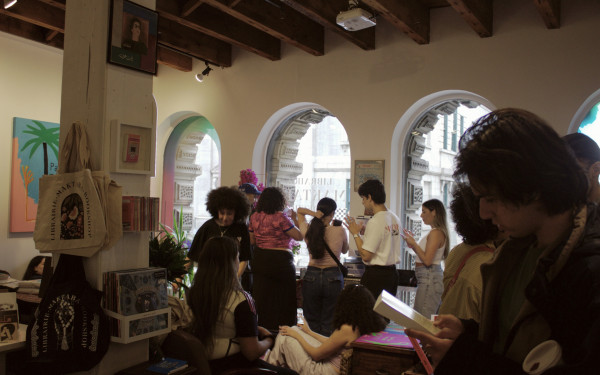The End of the Bookstore Cat?
The Link Investigates Whether Felix Literati’s Nine Lives Are Up
The Link’s Literary Arts section isn’t the only literary institution that’s on the way out these days. From the looks of it, the tradition of the bookstore cat—the seeming inevitability that any given used bookstore would come fully furnished with a furry feline prowling quietly through the stacks and sleeping on whatever surfaces were intended for human seating—is also phasing out.
As it is, the bookstore cat is not a trend that ever took much to the increasingly modernized world of literature.
“Only used bookstores have cats,” the owner of a bookstore that sells new and previously unused books told me when I told him I was doing a piece on the bookstore cat. I began to sense that he felt I’d somehow insulted the quality of his stock when he kindly asked me to leave and refused to answer any follow-up questions about cats.
Yes, cats and bookstores are a hallowed tradition—among used bookstores, anyway—and like Halloween and plastic flamingo lawn ornaments, they just make sense, despite defying logical explanation. Like most traditions, there’s a historical precedent, but it’s much harder to pinpoint what has made them endure in people’s imaginations.
“Cats were standard in European archives—and many still have them—mainly to deal with mice and rats,” said Nancy Marrelli, Archivist Emerita at Concordia University. “The idea is that the negative effects of having a cat in an archives are less serious than the side effects of having mice and rats.”
Terry Westcott, the owner of Westcott Books on Ste. Catherine Street West, doubted whether his cats Emma and Elliot had ever seen a rat in their lives, and admitted he didn’t know if they would know how to catch one if they saw one.
Found abandoned in an alleyway on separate occasions, Westcott adopted the cats—mere kittens at the time—and they have since lived with him in the shop and in his apartment just above the store.
“This guy,” he said, pointing at Elliott, “was so small you could hold him in one hand. He was about three months, four months old. They’ve never been anywhere else.”
Asked whether Emma and Elliott are a draw for customers, Westcott shook his head.
“It’s just the opposite,” he said. “Instead of attracting book people, they chase book people away because of the allergies. If I’d known that many people were allergic to cats, I probably wouldn’t have had them in the store. They come in the store and within two minutes their eyes are swollen and watering.”
During the summer, Westcott keeps the front door of his shop open, so that Emma and Elliott can come and go as they please, saving a small sum of money on cat food from the cafe and bistro patrons up the street who slip them part of their entrées.
“I guess it’s a surprise for people to see cats on Ste. Catherine Street,” said Westcott. “You see people with dogs on Ste. Catherine Street, but cats are a completely different matter.”
As to whether Emma and Eliot have added any to his bottom line, Westcott dismissed the notion.
“I doubt they’ve added any money to my bank account, but they’re good company,” he says. “I’m attached to them now, so what else can I do?”
“I doubt they’ve added any money to my bank account, but they’re good company. I’m attached to them now, so what else can I do?”
-Terry Westcott,
owner of Westcott Books
One bookstore owner, who no longer keeps a cat on-site, confessed to me—on condition of anonymity—that after the cat was gone he saw no decline in revenue, but a steep decline in people coming to his store.
“People still come in here and say, ‘Oh, where’s the cat,’ or, ‘I love the cat.’ There are people who have huge relationships with the cat, and I realized that most of these people were not book buyers. They were just coming in to see the cat.”
Stephen Welch, the owner of S.W. Welch Books on St-Viateur Street West., felt something was wrong with his bookstore cat Khan—that’s Star Trek Khan, not Coleridge Khan, mind—when after moving the store to a new location, the cat suffered drastic weight loss.
“We had her shaved and we took her weight, and she was four pounds,” he recalled. “As it turns out, she wasn’t eating.”
Welch suspects that Khan didn’t take to the new-paint smell of the shop, along with the heavy smell of mothballs that the previous tenants had—ironically—put down in the basement to get rid of rodents.
“Cats hunt by sense of smell,” said Welch. “If they can’t smell, they don’t eat.”
Welch took Khan home with him, after which she seemed to regain her appetite and lust for life. Though Welch has toyed with the idea of putting up a webcam in the store, so that Khan’s frequent admirers will still have a reason to stop by, so far those plans haven’t come to fruition.
It’s good to know, however, that the legacy of the bookstore cat, the genius loci of the shelves, still lives on in the hearts of the city’s literati, an anomalous cultural institution still outliving the expectations of those caught up in the hustle and bustle of modern bookselling. You’re unlikely to have anything cuddly to pet while mousing through e-bookstores in a decade or two, but if you don’t forget to feed it, maybe your local used bookstore will prove to have as many lives as its cat.
This article originally appeared in Volume 31, Issue 28, published March 29, 2011.







